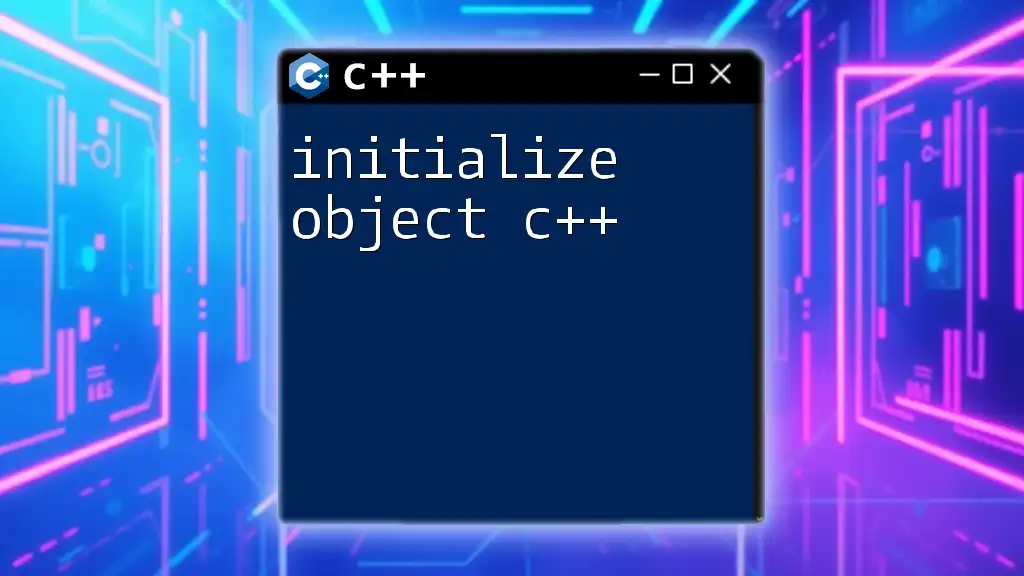To initialize a variable in C++, you declare its type followed by its name and assign it a value using the assignment operator (`=`). Here's a code snippet demonstrating this:
int myVariable = 10;
What Does It Mean to Initialize a Variable in C++?
In C++, initialization refers to the process of assigning a value to a variable at the time of its creation. It is crucial to distinguish between declaration and initialization—declaration is simply stating the variable's existence without assigning it a value, whereas initialization involves providing that variable with an initial value.
For instance, consider the following code snippet:
int a; // Declaration
a = 5; // Initialization
In this example, `a` is declared as an integer, and later initialized with a value of `5`.

Methods of Initializing Variables in C++
There are several ways to initialize a variable in C++, offering flexibility based on the context in which you are working. Let’s explore these methods in detail.
Using Assignment Operator
The most straightforward way to initialize a variable in C++ is by using the assignment operator (`=`) right after declaration. This method is prevalent in many programming languages.
Code Example:
int num = 10; // Initialization using assignment
In this example, an integer variable `num` is declared and initialized with a value of `10` simultaneously. This approach is simple and widely used.
Using Uniform Initialization (C++11)
With the introduction of C++11, a new syntax known as uniform initialization was added. This method promotes consistency and can help avoid certain types of bugs.
Code Example:
int num{20}; // Uniform Initialization
This syntax uses curly braces `{}` to initialize the variable, which has multiple advantages. One significant benefit is that it prevents narrowing conversions, helping to avoid potential errors when dealing with different data types.
Using Constructor Initialization for Objects
When working with user-defined types (objects of classes), initialization can also be carried out using constructors. This method allows you to set initial states for your objects.
Code Example:
class MyClass {
public:
MyClass(int n) { /* constructor code */ }
};
MyClass obj(30); // Object initialization with a constructor
In this example, `MyClass` has a constructor that accepts an integer, allowing `obj` to be initialized with a specific value, demonstrating how object-oriented programming practices integrate with variable initialization.

Best Practices for Variable Initialization in C++
Initial variable initialization is a critical aspect of writing clean and maintainable code. Here are some best practices to keep in mind:
-
Ensure all variables are initialized: Always initialize your variables before you use them. This practice prevents undefined behavior and potential bugs in your program.
-
Avoid using uninitialized variables: Attempting to read the value of uninitialized variables can lead to unpredictable outcomes, including runtime errors or garbage values.
Code Example:
int uninitializedVar; // Forgetting to initialize can lead to undefined behavior
In this case, `uninitializedVar` may contain a random value, leading to confusion and bugs when used later in the code.

Common Mistakes in Variable Initialization in C++
Even seasoned programmers can make mistakes while initializing variables. Here are some common pitfalls to watch for:
-
Mistake: Improper use of initialization syntax: Using incorrect syntax can lead to syntax errors or unintended behavior. Always stick to the standard conventions for variable initialization.
-
Mistake: Forgetting to initialize variables: This is one of the most prevalent mistakes among beginners. Forgetting to initialize a variable can result in the use of garbage values, causing unpredictable behavior in your program.
Code Example:
int wrongVar; // No initialization
std::cout << wrongVar; // Output could be garbage value
In this snippet, printing the `wrongVar` could yield an unpredictable result, which might not be informative and can complicate debugging efforts.

Tips for How to Initialize Variables in C++
When initializing variables, consider the following tips to enhance clarity and maintainability in your code:
-
Use meaningful and descriptive names: Choose variable names that convey their purpose. This practice helps others (and future you) understand the code more easily.
-
Prefer initialization to declaration for better readability: Whenever possible, initialize your variables upon declaration. Doing so streamlines your code and makes it clear which values are assigned and helps prevent errors in using uninitialized variables.

Conclusion
In summary, understanding how to initialize a variable in C++ is essential for creating robust and error-free applications. Proper initialization practices not only prevent runtime errors but also contribute to writing more readable and maintainable code. Take the time to master variable initialization, and you'll be better equipped to handle the complexities of programming in C++.

Further Reading
For those looking to deepen their understanding, consider exploring additional resources on variable initialization in C++, including official documentation and tutorials, to further hone your skills.

















